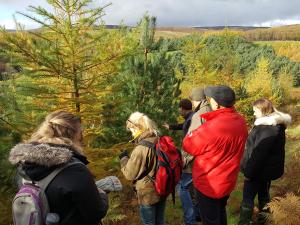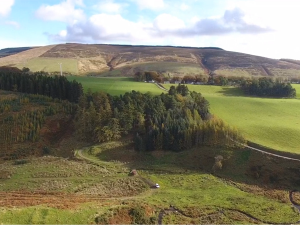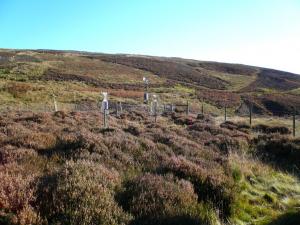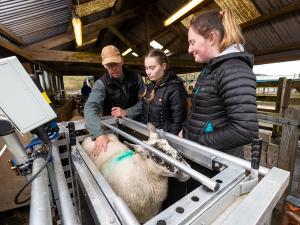
Glensaugh is the home of our Climate-Positive Farming Initiative.
Our Institute's research farms have an important and exciting role to play in testing and demonstrating innovative ways of managing our land.
Our Climate-Positive Farming Initiative builds on a long tradition at Glensaugh for wide-ranging research into many different elements of farming – environmental, economic and social.
You can find the James Hutton Institute's Climate Action Plan here - it includes all our research farms (including Glensaugh) and campuses.
Responding to the climate and biodiversity crises.
Reports published in 2019 by the Intergovernmental Panel on Climate Change (IPCC) and the Intergovernmental Panel on Biodiversity and Ecosystem Services (IPBES) gave hard-hitting messages about the urgent need for changes in land use and management if we are to avoid worst-case climate change scenarios and irreversible biodiversity losses.
Farms have a major role to play in making transformative changes to address these challenges - at Glensaugh we are exploring how this can be done.
At Glensaugh we are exploring technological and agro-ecological design and management for a low-carbon economy and a new way of farming, based on an integrated land use approach with multiple benefits for nature and sustainable livelihoods for people.
Glensaugh.
 Glensaugh is managed as an upland livestock farm, just over 1000ha in area, with sheep, cattle and red deer, improved and extensive pastures, moorland, woodland and peatland. The Highland Boundary Fault divides Glensaugh into two distinct geological zones.
Glensaugh is managed as an upland livestock farm, just over 1000ha in area, with sheep, cattle and red deer, improved and extensive pastures, moorland, woodland and peatland. The Highland Boundary Fault divides Glensaugh into two distinct geological zones.
Glensaugh currently has c 17% woodland cover, which is being proactively managed and expanded - for carbon storage, biodiversity and other benefits - reflecting the ambitions of the UK and Scottish Governments.
The farm is unique in also having an area of mature agroforestry, planted in the 1980s to explore the production benefits of integrating trees within a livestock farming system - this has provided a living demonstration of the longer-term practicalities of agroforestry management as well as the wider environmental benefits for climate change mitigation and adaptation. We have several research projects associated with this facility, including the UKRI-funded FARM TREE project in collaboration with Aberdeen University, which is part of the Future of UK Treescapes Programme.
Decades of research and monitoring.
 Glensaugh has a fantastic collection of historical baseline data and scientific observation spanning many decades, which is ideal for underpinning research and demonstration of the scale and nature of transformation needed in farming, as well as the significant contribution that the sector can make towards the Government’s climate and biodiversity targets. Glensaugh is also a national monitoring centre for the Environmental Change Network (ECN), Cosmic-ray Soil Moisture Observing System UK (COSMOS-UK), and the Defra Acid deposition (UKEAP) network. It is also an Ecological Continuity Trust LTE/LTM Hub and a BIOSCAN-UK project site.
Glensaugh has a fantastic collection of historical baseline data and scientific observation spanning many decades, which is ideal for underpinning research and demonstration of the scale and nature of transformation needed in farming, as well as the significant contribution that the sector can make towards the Government’s climate and biodiversity targets. Glensaugh is also a national monitoring centre for the Environmental Change Network (ECN), Cosmic-ray Soil Moisture Observing System UK (COSMOS-UK), and the Defra Acid deposition (UKEAP) network. It is also an Ecological Continuity Trust LTE/LTM Hub and a BIOSCAN-UK project site.
Long-term research platforms like Glensaugh are fantastic places to conduct long-run, whole-farm experiments including those which for a private farmer could be high-risk – as a research farm we can test and demonstrate transformative ways of managing our uplands, underpinned by rigorous science.
Teaching and demonstrating.
Teaching is an important and integral activity for the institute and its research farms, and forms an important element of our work at Glensaugh. Our research findings combined with on-farm demonstrations give powerful opportunities to provide independent, objective advice on synergies and trade-offs, and the cultural, structural and technological opportunities and barriers which can emerge during transition towards climate-positive farming.
On-farm visits can be actual and virtual - with new techniques in visualisation (e.g. Virtual Reality videos) developed by our institute’s scientists. Have a look at our Virtual Farm pages for examples of what we have developed thus far.
 The farm is already being used by various colleges and universities (photo courtesy of SRUC) for training and research and, reflecting our commitment to the open science agenda, is also available for other Institutions for research or educational purposes.
The farm is already being used by various colleges and universities (photo courtesy of SRUC) for training and research and, reflecting our commitment to the open science agenda, is also available for other Institutions for research or educational purposes.
In addition to the outdoor research facilities, Glensaugh has flexible indoor spaces with meeting rooms, computing facilities, kitchen, laboratories, ovens, freezers, cold stores and more.
Please contact us if you are interested in the possibility of using any of our facilities (indoor and/or outdoor), setting up research, sample processing and/or teaching at Glensaugh.
